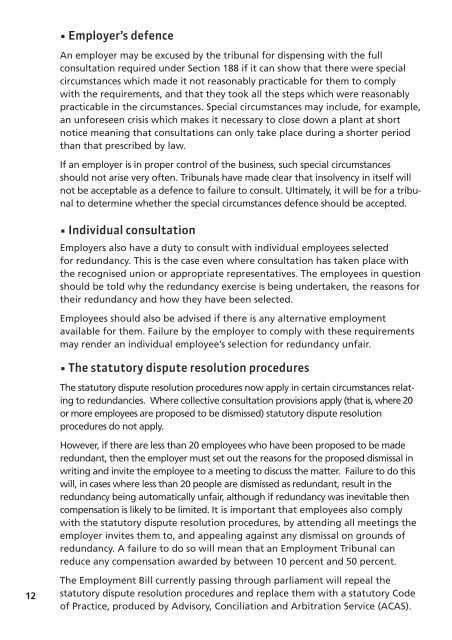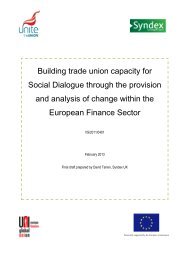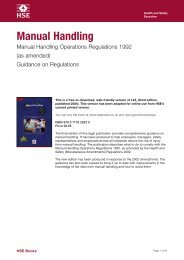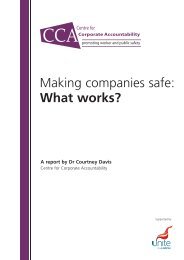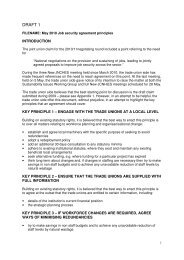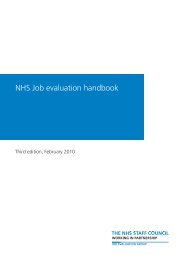Redundancy - Unite the Union
Redundancy - Unite the Union
Redundancy - Unite the Union
Create successful ePaper yourself
Turn your PDF publications into a flip-book with our unique Google optimized e-Paper software.
• Employer’s defence<br />
An employer may be excused by <strong>the</strong> tribunal for dispensing with <strong>the</strong> full<br />
consultation required under Section 188 if it can show that <strong>the</strong>re were special<br />
circumstances which made it not reasonably practicable for <strong>the</strong>m to comply<br />
with <strong>the</strong> requirements, and that <strong>the</strong>y took all <strong>the</strong> steps which were reasonably<br />
practicable in <strong>the</strong> circumstances. Special circumstances may include, for example,<br />
an unforeseen crisis which makes it necessary to close down a plant at short<br />
notice meaning that consultations can only take place during a shorter period<br />
than that prescribed by law.<br />
If an employer is in proper control of <strong>the</strong> business, such special circumstances<br />
should not arise very often. Tribunals have made clear that insolvency in itself will<br />
not be acceptable as a defence to failure to consult. Ultimately, it will be for a tribunal<br />
to determine whe<strong>the</strong>r <strong>the</strong> special circumstances defence should be accepted.<br />
• Individual consultation<br />
Employers also have a duty to consult with individual employees selected<br />
for redundancy. This is <strong>the</strong> case even where consultation has taken place with<br />
<strong>the</strong> recognised union or appropriate representatives. The employees in question<br />
should be told why <strong>the</strong> redundancy exercise is being undertaken, <strong>the</strong> reasons for<br />
<strong>the</strong>ir redundancy and how <strong>the</strong>y have been selected.<br />
Employees should also be advised if <strong>the</strong>re is any alternative employment<br />
available for <strong>the</strong>m. Failure by <strong>the</strong> employer to comply with <strong>the</strong>se requirements<br />
may render an individual employee’s selection for redundancy unfair.<br />
• The statutory dispute resolution procedures<br />
The statutory dispute resolution procedures now apply in certain circumstances relating<br />
to redundancies. Where collective consultation provisions apply (that is, where 20<br />
or more employees are proposed to be dismissed) statutory dispute resolution<br />
procedures do not apply.<br />
However, if <strong>the</strong>re are less than 20 employees who have been proposed to be made<br />
redundant, <strong>the</strong>n <strong>the</strong> employer must set out <strong>the</strong> reasons for <strong>the</strong> proposed dismissal in<br />
writing and invite <strong>the</strong> employee to a meeting to discuss <strong>the</strong> matter. Failure to do this<br />
will, in cases where less than 20 people are dismissed as redundant, result in <strong>the</strong><br />
redundancy being automatically unfair, although if redundancy was inevitable <strong>the</strong>n<br />
compensation is likely to be limited. It is important that employees also comply<br />
with <strong>the</strong> statutory dispute resolution procedures, by attending all meetings <strong>the</strong><br />
employer invites <strong>the</strong>m to, and appealing against any dismissal on grounds of<br />
redundancy. A failure to do so will mean that an Employment Tribunal can<br />
reduce any compensation awarded by between 10 percent and 50 percent.<br />
12<br />
The Employment Bill currently passing through parliament will repeal <strong>the</strong><br />
statutory dispute resolution procedures and replace <strong>the</strong>m with a statutory Code<br />
of Practice, produced by Advisory, Conciliation and Arbitration Service (ACAS).


